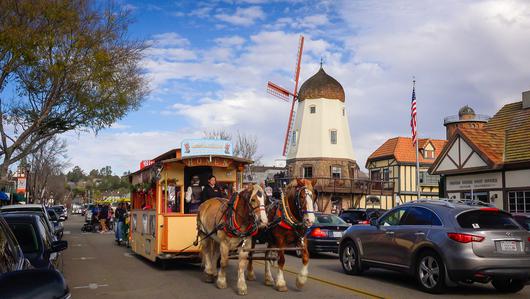11 Must-Try Waterfall Hikes in Los Angeles
All waterfall hikes in L.A. have one thing in common—unbeatable views of terrific cascades. Here are the ones to try next.

Purchasing a new car can be both exciting and exhausting; from determining what features you need, to figuring out your financing options, to dealing with pushy salespeople, the joy can quickly fade to frustration if you are not prepared. Luckily, there are ample resources available and plenty of tips to set you up for success throughout the entire process.
Buying a car can be particularly irksome because it is a big-ticket purchase that often requires negotiations in order to receive a fair price. While this process can get emotional, being able to separate your feelings from the facts is vital to getting a good deal, and having the necessary information at the ready will help protect you from getting into a bad situation. Here are a few things to consider at each stage when getting a new or used car.

Does your business rank among the best in California?
nominate a businessLearn more about our selection criteria and vetting process.
Research the car brands you are interested in, making the extra effort to find mechanics in your area who are able to work on that particular brand, check out pricing for common repairs, assess the safety and reliability ratings, and read reviews. While the initial price tag of a car may be low, it may cost you more in the long run and become an unmanageable money pit if it has recurring issues and high maintenance costs.
Similarly, knowing which features are absolute “musts” on your list and which ones are “nice-to-haves” can help to steer your search in the right direction, and guard you against being upsold or stepping into a vehicle that meets your wants but not your everyday needs. Salespeople will undoubtedly try to convince you to buy additional features or show you something other than what you came in for, so understanding what you are looking for and what price is reasonable will drastically simplify your search.
Walking into a dealership without a plan can feel like stepping on a hill of ants; though they probably do not wish to do you much harm, they swarm all over and make you want to run away.
Before going out to any dealerships, understand where you are in the car-buying process—whether you are looking to make an immediate purchase, are just browsing, or are trying to find the right dealership to buy from—as well as what type of car you are looking for, how much you can spend, and how you intend to pay. If you are going to pay with cash, don’t offer up that information too early, as dealers may not give you the best price possible, knowing that they will not get any additional money from you through a financing plan.
You should also prepare to negotiate the price of the vehicle prior to giving away any information about financing, but be open to the dealer’s options as well. While you may have the cash necessary to make a full purchase on the spot, a zero-percent financing negotiation may allow you to avoid extra fees—without having to pay everything up front. Going in with an open mind and a game plan will make in-the-moment decisions easier to navigate.
It’s important to know your financial standing, credit score, and financing options so you do not end up underwater on a loan. Knowing how much you can afford every month, how much you can pay up front, and what rates to expect given your credit score will inform any decisions about purchase price and financing.
Car dealers are out to make money, so they may not always have your best interest at heart. Being prepared with a pre-approved loan or at least being aware of what other financial institutions can offer may save you thousands of dollars down the line, so it is very worthwhile to spend some time figuring out all your financing options.
Different dealers can offer different prices and financing options, so do not set out with only one dealer in mind. If you are incredibly restricted and are able to visit only one dealership, do some research before settling on which spot to head to. Check the websites of competing dealerships to compare costs, then call each location and see if it can beat the lowest price offered.
Look into different geographies, too, and don’t hesitate to drive to the next town over to get a better deal. Your local dealership might sell hybrid cars like they’re going out of style but have a hard time selling an SUV or truck, while the opposite could be true in a more rural environment just a few miles down the road.
When dealers know that they have competition and that you are an informed shopper, they are more likely to give you a better price, so use this to your advantage.
Though monthly payments may be at the top of your mind, it can be easy to forget about the change in your insurance policy that comes with a different vehicle. Make sure that you factor this change into your decision when choosing the make and model of the car so you avoid unexpected hardships.
Before committing to a vehicle, it is essential to drive it so you can get a feel for the way it handles, see how comfortable it is to ride in, and evaluate the visibility. While it can be tempting to jump right into the driver’s seat, take the time to settle into the passenger seat and the back seat, too, so you can better gauge the legroom and the comfort level your guests will experience.
Similarly, you will want to drive around on various terrains, if possible. Driving on freeways and residential streets can feel entirely different from one another, so make sure to prioritize these types of roads. But if you plan to drive on dirt or gravel often, check that the car handles well in these situations, too.
Just because you spent an hour at the dealership talking to salespeople and taking a test drive does not mean that you should feel pressured to stick around if the deal is not right or if you are not quite ready to buy. If you feel uncomfortable at any point, there is nothing wrong with walking away, going to another dealer, or putting off the purchase decision for another day.
Even showing that you are willing to walk away and do what is right for you can be enough for a dealership to offer you a better deal. Having the ability to separate ego from the situation is powerful and will show the salespeople that you are in charge and are not gullible enough to get taken for a ride.
It can be hard not to get swept up in the moment with the excitement of purchasing a new car, but knowing your budget and credit score can greatly impact the types of deals you are willing to accept. Doing your research is an important first step, but you must stick to the guidelines you have set out for yourself while at the dealership.
If there is an additional feature you hadn’t thought about or there are extra taxes tacked on, think about the implications for your monthly payments, and do not accept something that will negatively impact your life and financial standing for years to come.
You could find yourself in a situation where everything goes wonderfully and you are able to get the car with all the features you desire at a price that fits into your budget, but you are not quite ready or in the right emotional state to seal the deal—and that’s okay. Unless there is an immediate need for the vehicle or a high possibility that the car might not be there later on, there is no reason to buy it on the same day if it doesn’t feel right. So take the evening to solidify your position, and return with a clear head another time.
There can be a lot of pressure to make a purchase right away, and it is easy to feel guilty for wasting someone’s time, but the truth is that you didn’t: It is the salesperson’s job to support you in the buying process, and if you had a genuine connection with the car and the person, you can always ask for that particular individual when you return to make to purchase so he or she receives the commission.
Figuring out how much your current car is worth will significantly impact what you are willing to accept for it at the dealership. Make sure to negotiate the final price of the new car before mentioning the trade-in, however, so you avoid a situation in which the dealer undervalues the trade-in or overcharges you for the new vehicle by bundling everything into a single price.
The purchase price, trade-in value, and financing are all separate figures, so keeping the conversation focused on one item at a time will bring a level of clarity that makes it easier to agree on a deal. You may also want to consider selling your old car yourself; you can sell it to an individual or a used-car dealer who may be willing to give you more than what the dealership is offering, so knowing how much your car is worth given its specific features and condition can greatly influence your decision.
While buying a new car can be exciting and overwhelming, remembering that it is a business transaction can help you separate the emotions from the facts and remind you to make a good deal instead of a rash decision.
Though the salespeople may be nice and friendly, at the end of the day, their job is to sell you something and make money for the dealership (and themselves). Remaining level-headed about the role of each individual can clarify the interaction and remove some of the pressure and anxiety involved in the process.
Again, the salespeople aim to make the most money possible for the dealership, and add-ons are a big portion of this. Though it may only sound like a couple of extra dollars per month, take the time to calculate the total cost over the years—and remember that extra taxes and interest are not included in that figure. If the feature is still worth it to you and fits within your budget, then go for it, but if it isn’t essential or feasible, opt to forego it.
Reading through all of the terms and conditions may sound terribly boring, but it is well worth your effort and time to double check that the terms match what you discussed with the dealer before you sign on the dotted line. A car purchase will likely affect you for years to come, so it is worth taking an afternoon to thoroughly understand the details of your legally binding contract.
Make sure the financing offer that you worked so hard for is set in stone before you drive the car off the lot. Driving away before all of the paperwork is finished can leave you open to dealer tricks, and you may form an emotional attachment to the car that will push you to accept a more expensive offer later. Finalizing every last detail prior to leaving the dealership allows you to relax and enjoy your new purchase without guilt, worry, or stress.


All waterfall hikes in L.A. have one thing in common—unbeatable views of terrific cascades. Here are the ones to try next.

Discover how to track and prepare for meteor showers in California for a spectacular celestial viewing experience.

Ditch the busy Spring Break crowds and check out these fantastic, underrated spring travel destinations in California.

Gaze into California's amazing sunsets with our exploration of the top sunrise spots in California.

